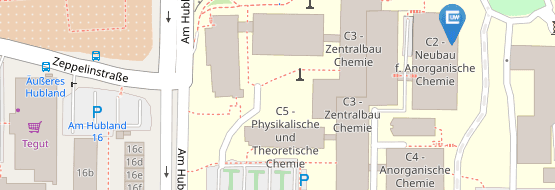Synthesis and reactivity of NHC-stabilized transition metal complexes
Synthesis and reactivity of transition metal complexes (mainly group 8 – 12 metals), which are stabilized with NHC ligands and related molecules
Research in this field covers basic organometallic synthesis and characterization of novel ligands and complexes as well as the investigation of the properties and reactivity of these compounds. We are currently investigating transition metal complexes mainly group 8 – 12 metals, which are stabilized with NHC ligands and related molecules, with a certain focus on the 3d metal of this row. These metals are relatively inexpensive, usually not toxic, and in many cases environmentally benign. For iron, cobalt, and zinc, for example, enzymes of these metals are involved in a multitude of biological processes. However, in contrast to their heavier 4d and 5d congeners complexes of these metals, their reactivity as well as their use and modus operandi in homogeneous catalysis is much less explored. The most frequently used catalyst systems nowadays are based on rare heavy transition metals such as ruthenium, palladium, platinum rhodium, iridium, and gold, which are not only very expensive but also often toxic mainly due to interactions of complexes of these metals with enzymes, nucleic acids, and other biological molecules. Thus, we focus currently on 3d metals, with an emphasis on nickel and cobalt complexes, and you will find many examples for such compounds in the publication section.



